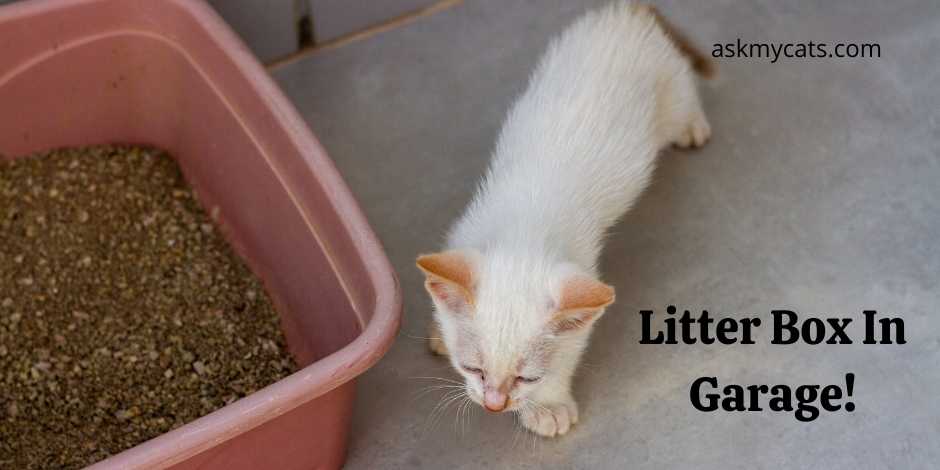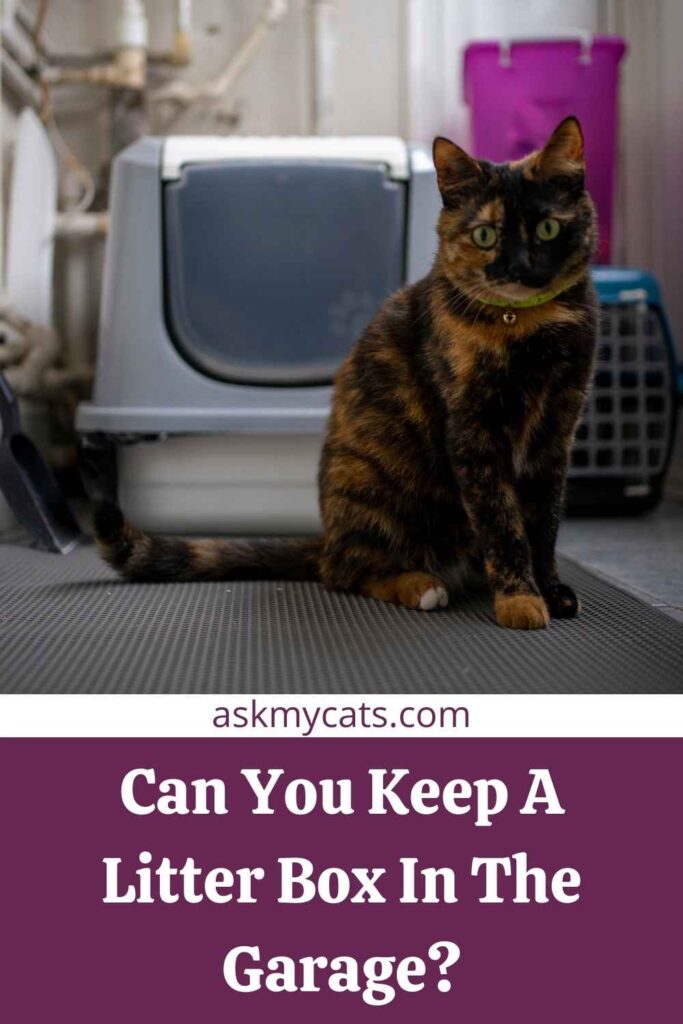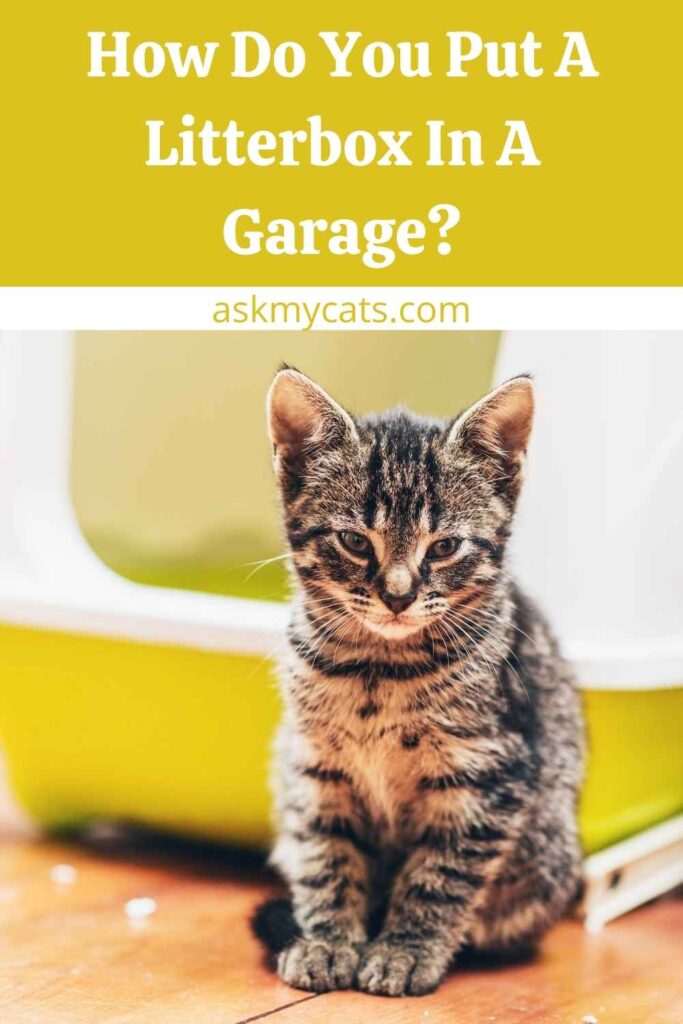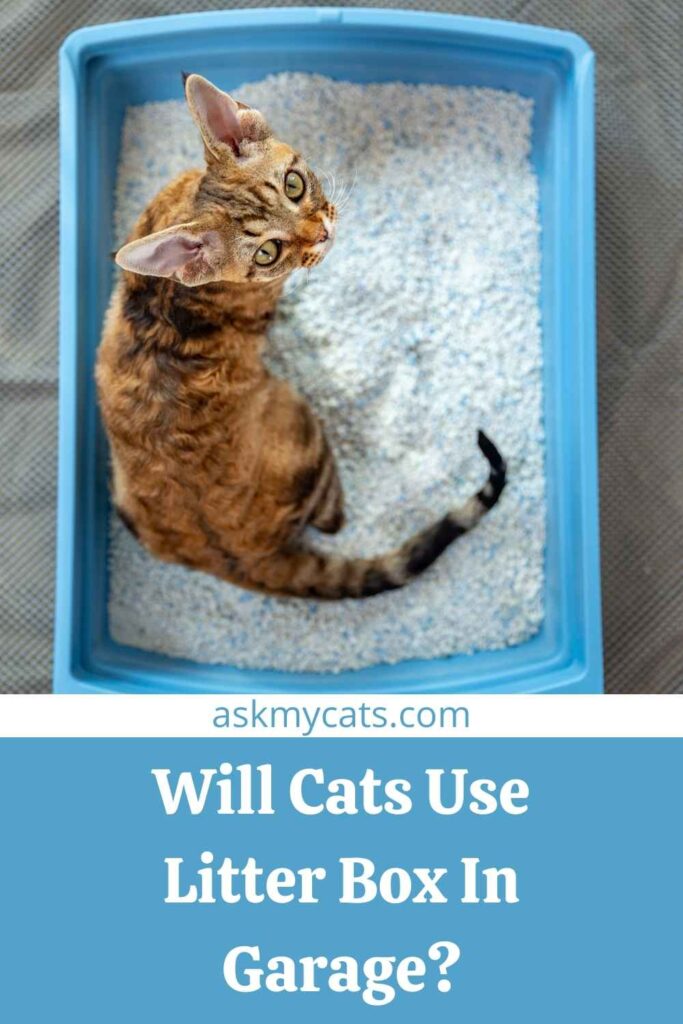Whether you live in a huge house in the suburbs or a small apartment, the location of your cat’s litter box is a concern for many cat parents.
On the one hand, you want to delight your cat, but on the other, you’d prefer to keep the litter box hidden, especially while visitors are around.
Some of you may have a spare room, but what if you have an unusual place, such as a garage, that you’d like to check out?
The garage is normally gloomy and, depending on the season, might be overly hot or chilly. This can have an impact on the condition of the litter as well as your cat’s litter box habits. Your cat might hide in the engine of your automobile or flee via the garage doors.
Continue reading to find out if the garage is the best spot to put your cat’s litter box or how to convert it into one.


Give Your Cat the Perfect Day
Get the Free Ebook!
Can You Keep A Litter Box In The Garage?
You should not keep a litter box in the garage since it’s unsafe for them.

This is an important topic to ask because if you “park” your cat in the garage daily, several potential concerns are to consider.
To begin with, putting the litter box in the garage implies that your cat must have access to it at all times. As a result, your kitty pet may be using their toilet only whenever you arrive home.
Your cat will most likely be scared by the loud noises from the car’s engine and door. This may result from fleeing via the garage door, or you may accidentally run them over or injure them.
Even if you don’t damage your cat or they don’t manage to escape, this can be a stressful experience for them, and they may refuse to return to the garage after that.
This means they’ll most likely begin soiling in other places of your home, and they may come to associate the litter box with a frightening incident even if you decide to bring the litter box back in.
Another significant concern is the vehicle’s power plant. You may have observed that your cat prefers hiding behind covers and blankets, especially during the winter.
Interesting Read: Can Cats Live In A Garage In The Winter?
They generally do this to remain warm, which is why your cat can wind up sheltering under the car’s engine that you shut off a few minutes ago.
On the other hand, the car engine is significantly more harmful than the radiator. It can result in severe burns or become lodged in your engine.
Another risky and maybe tragic scenario is driving away without noticing your cat is hidden inside your vehicle.
A garage serves as a storage space for items that they are too lazy to dispose of for many people. It might be a good spot to put your equipment, such as cut wood for your fireplace, cleaning supplies, paints, and even insecticides.
Many of us have cupboards and many shelves to put these cat magnets on. All of these things have the potential to be harmful once more. Cats are curious creatures that despise closed doors, tend to follow our every move, and get themselves into mischief.
A garage/storeroom is the ideal location for mischief. They may drop a chemical-filled container on the floor, or a big object could fall on top of them.
For some of you, the answer may be yes since you don’t park your car in the garage and have taken all reasonable efforts to keep harmful equipment and chemicals out of the reach of your cat.
Must Read: Can I Keep My Cat In The Garage At Night?
How Do You Put A Litterbox In A Garage?

You can create an external attachment mounted on the wall that goes into your home instead of leaving the entire garage open for your cat to explore.
This may be accomplished by cutting a hole in the wall and installing a cat door to allow your cat free access. The roof is normally on hinges so you can prop it open and scoop, and the enclosure is usually constructed of wire to appear like a cage.
You might make one yourself or locate a temporary outside enclosure that serves the same purpose if you’re handy.
There’s a popular myth that cats can see in the dark, but this isn’t true.
Cats are crepuscular creatures, meaning they can see better when the sun sets, and the light fades. This explains why they’re so busy at night and in the morning.
Complete darkness might make it difficult for a cat to navigate and securely access their litter box unless you have a window in your garage or a recessed light that is always burning.
Sure, they have their sense of smell, but a dimly illuminated environment can contribute to your cat’s already vulnerable position when they try to use the bathroom.
Will Cats Use Litter Box In Garage?
Cats will not prefer to use a litter box in a garage.

Your cat’s second or third litter box can possibly be in the garage. This means you’ll still need to maintain one or two of their litter boxes on hand.
This will allow your cat to perceive the garage as an extension of their domain while still feeling in charge of the main home.
Cats do not prefer their litter box to be in a secluded location, but they do want a sense of security when using it.
A corridor between rooms is generally a site where people pass by frequently, especially if you don’t leave alone. This and other high-traffic locations might make your cat nervous and cause them to avoid using the litter box.
Your cat prefers to use the potty in an area where you spend most of your time. While the garage is often a low-traffic place that may suit certain cats, it may be too secluded for others.
Just though an area or room in your house appears to be the ideal location for your cat’s litter box doesn’t guarantee your cat agrees.
Because some cats are turned off by noise, placing the litter box near an item such as a dryer, wall heater, or washing machine may cause them to seek another place to relieve themselves.
You might assume that one litter box is plenty for your cat, but vets believe that one litter box for each cat in the house, plus one extra, is the golden rule.
This implies that if you have two cats, you will want three litter boxes, and so on. While one cat may share a litter box with another, two cats are not permitted to share a litter box.
It’s also worth noting that putting all the litter boxes near each other creates the illusion of having one large box. Your cats will not notice the difference, and due to the loss of privacy, probable litter box bullying, and general and territorial hostility, they may develop bathroom issues.
Finally, I’m sure you already know how much your fluffy overlord enjoys a clean litter box, but cleanliness doesn’t just mean cleaning the litter every day and changing it regularly.
You must keep the litter box away from their food and drink at all times!
How Do You Train A Cat To Use The Litter Box In The Garage?
You can train your cat to use the litter box in the garage and make a habit out of it.
Cats regard litter boxes as a means of claiming territory. So you can keep your existing litter boxes where they are and place a litter box in the garage with the door pushed open. Install the garage cat door when they’ve become used to it.
Move their other boxes to the garage after they’ve gotten used to it. You can also place the boxes at the house’s front door and provide them with a cat tree. You’re enlarging their domain in this way.
Frequently Asked Questions
What attracts a cat to a litter box?
Since their granular nature made it simpler to hide their excrement, the wiser cats preferred soft ground or sand. This is why cats are naturally drawn to the sensation of cat litter and instinctively know what to do when they come into contact with it.
Do cats prefer open or closed litter boxes?
Litter boxes should be made particularly for the cats using them. Cats prefer clean, big, exposed litter boxes. They should be at least one-and-a-half times the length of the cat, allowing the cat to spin around and fit comfortably.
Where is the best place to put a litter box?
The optimum location is a secluded area, such as a guest bedroom or bathroom. A sectioned-off area is another wonderful choice if you don’t have enough bathroom space. It’s excellent to have a laundry room since it’s quiet, low-traffic, and easy to clean.
Final Words
Litter boxes may be smelly, and they don’t exactly scream aesthetics, so many cat parents prefer to hide them in a dark corner of the garage.
Of course, as previously said, your garage does not need to be gloomy or chilly. It may be entertaining, safe, and even a personal hobby place!
